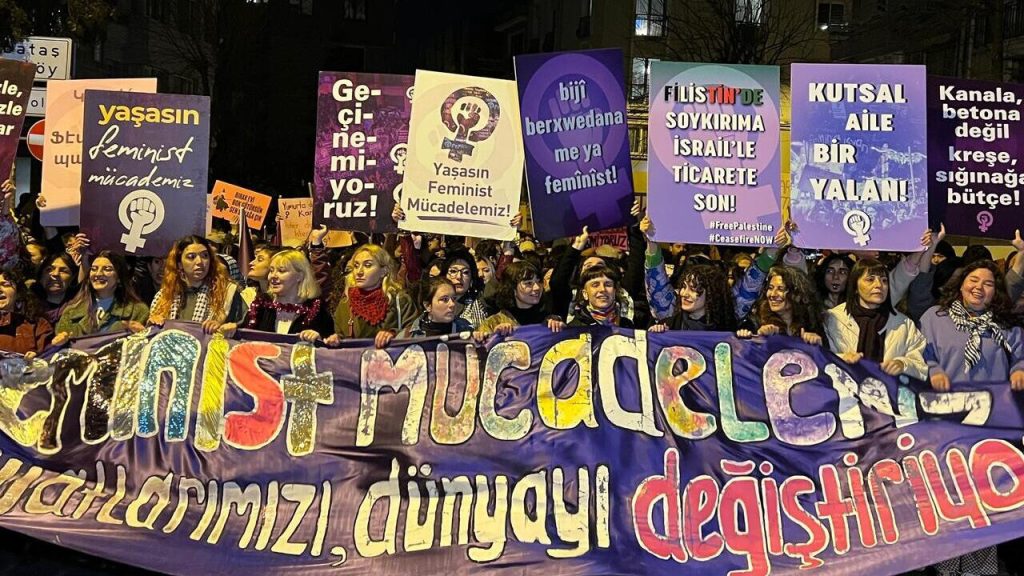On March 8, thousands of women gathered in the Beyoğlu district of Istanbul for the annual Feminist Night March, defying a government ban imposed by the Istanbul Governor’s Office. Despite heavy police restrictions, including the blockade of Taksim Square and surrounding areas, demonstrators took to the streets to voice their demands for gender equality and human rights. The protest, marked by slogans like “Woman, life, freedom,” highlighted the ongoing struggles against violence, oppression, and authoritarianism faced by women globally.
| Article Subheadings |
|---|
| 1) The Significance of the Feminist Night March |
| 2) Police Presence and Protest Restrictions |
| 3) Voices of Resistance: Chants and Messages |
| 4) The Press Statement and Global Solidarity |
| 5) Detentions and the Impact of Police Interventions |
The Significance of the Feminist Night March
The Feminist Night March, held on International Women’s Day, serves as a crucial platform for advocating women’s rights and raising awareness about gender-based violence and systemic inequalities. This particular march is historically significant as it not only draws attention to local issues in Turkey but also connects with global feminist movements. The event is held annually in various cities around the world, uniting individuals across borders in their fight for equality and justice. As such, the march in Istanbul reflects both local grievances and a broader struggle against patriarchal oppression, making it a vital event for the feminist movement.
Police Presence and Protest Restrictions
On the day of the march, police authorities imposed significant restrictions, aiming to contain the gathering of demonstrators. Security forces erected metal barricades, effectively blocking access to Taksim Square, known for its symbolic significance as a site of protests in Turkey. The Governor’s Office had declared the march illegal, prompting these preemptive measures. Such actions highlight the ongoing tension between civil liberties and government control in Turkey. The extensive police presence served to intimidate participants, yet thousands chose to gather on Sıraselviler Street, demonstrating their resolve to protest despite the risks of arrest and confrontation.
Voices of Resistance: Chants and Messages
As protesters congregated on the streets, they chanted powerful slogans that resonate with their collective struggle for freedom and equality. With phrases such as “Jin, jiyan, azadi” (Woman, life, freedom in Kurdish) and “We won’t stay silent, we won’t fear, we won’t obey,” the chants encapsulated the spirit of determination among the demonstrators. Their unity was further illustrated as they linked arms and sang songs, affirming their solidarity against oppression. The police deemed the slogans “illegal,” leading to heightened tensions as protesters defiantly responded by blowing whistles and continuing their chants, showcasing their unyielding commitment to their cause.
The Press Statement and Global Solidarity
Following the march, demonstrators delivered a significant press statement in Arabic, Kurdish, and Turkish, emphasizing the transformative power of feminism in addressing global issues. The declaration reflected on the historical successes of feminist movements while acknowledging the ongoing injustices that women face today, ranging from violence to systemic inequality. Protesters called for an end to authoritarian policies that restrict women’s rights and emphasized the need for solidarity among marginalized groups worldwide. Their statements drew strength from historical figures and modern activists, representations of resilience in the face of adversity. As the crowd dispersed, the message that they would not remain silent resonated clearly, highlighting their commitment to a future built on equality and justice.
Detentions and the Impact of Police Interventions
Despite the overwhelming police presence, the demonstration culminated in confrontation as authorities began detaining participants. Reports indicate that over 112 individuals were taken into custody as they attempted to leave the area through a police corridor. This action not only reflects the government’s harsh stance towards dissent but also raises concerns about civil liberties and the treatment of protesters in Turkey. Videos shared by organizers capturing the events suggest that at least 200 demonstrators were surrounded by police, underscoring the ongoing battle for the right to protest. Such interventions highlight the risks that activists face while advocating for their rights amid governmental repression.
| No. | Key Points |
|---|---|
| 1 | Thousands of women participated in the Feminist Night March in Istanbul despite a police ban. |
| 2 | Police enforced significant restrictions, including barricading access to Taksim Square. |
| 3 | Protesters expressed solidarity with global feminist movements through chants and slogans. |
| 4 | A press statement highlighted the struggles against oppression and called for continued resistance. |
| 5 | Over 112 demonstrators were detained, raising concerns about police response to peaceful protests. |
Summary
The Feminist Night March held in Istanbul on March 8 served as a powerful demonstration of women’s resilience and solidarity in the face of repression. Despite police attempts to suppress the gathering, participants remained undeterred, vocalizing their demand for equality and justice. The event not only underscored the significance of activism in achieving social change but also highlighted the ongoing struggle against authoritarianism in Turkey and the importance of global feminist movements. The arrests and confrontational tactics employed by authorities bring attention to the need for continued advocacy for civil rights and gender equality.
Frequently Asked Questions
Question: Why was the Feminist Night March banned?
The Istanbul Governor’s Office declared the march illegal, leading to the police imposing restrictions and blocking access to key areas. This reflects ongoing tensions between government control and civil rights movements in Turkey.
Question: What were some of the key messages expressed during the march?
Protesters voiced messages demanding gender equality and an end to violence against women, using slogans such as “Jin, jiyan, azadi” and affirming their commitment to not remain silent in the face of oppression.
Question: How did authorities respond to the demonstration?
Authorities responded with a heavy police presence, using barricades to restrict access and subsequently detaining over 112 individuals as they attempted to leave the march, raising concerns about civil liberties and the treatment of activists.


